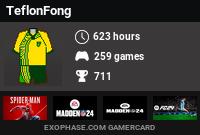Fanboy culture is real, very real. But the passion, while misguided, is genuine - videogames are SUPPOSED to produce fanboys - if you don’t have a preference between Sonic and Mario, you are not part of the passionate discussion. Sure, you can like and appreciate both franchises - but c’mon - there HAD to be an allegiance between either Sega or Nintendo during your youth - don’t tell me you were one of those kids when EVERY other kid had sides was the one saying “guys actually both games have their strengths”
So, to envision the people who write reviews as COMPLETELY unbiased is somewhat unfair - and I can’t emphasize that qualifier “COMPLETELY” enough - I have a communications degree and I know how important it is for journalists to be unbiased but I recognize it is almost impossible to be COMPLETELY unbiased.
This might be shocking to some of you who view a certain publication or website as having a sterling reputation and is always fair and balanced and I will agree with you that the majority of the sites and magazines are fair and balanced and have always had a sterling reputation - but the writers will have some bias, and that’s okay.
You read it all the time in reviews - I have a “soft spot” for Mario, As a fan of the Mario Kart series, as an unapologetic fan of the Resident Evil series, etc. even in Polygon’s review policy they have verbiage - “We've never played a perfect game. Except for The Legend of Zelda: A Link to the Past.”
There is nothing wrong with this kind of bias, it is inherent to every videogame fan…in fact, if you claim you have NO bias at all, then I am questioning if you truly have a passion for videogames.
Its like in sports - sure you might be a neutral watching the Super Bowl because your team is not in it for that particular season - but you DO have a team. Is anybody a true football fan if they don’t have a team at all? Is there such thing as a perennial neutral - “I like all the teams” ?
So, what is the problem with reviews - if writers commonly and unapologetically state their inherent bias or soft spot or whatever full disclosure verbiage they use - its usually the format and the score and the nature of the review process and timing.
Last of Us was a game that got many plaudits - I stated in my blog at the time that the game was a haunting experience, its the kind of game that stays with you, almost like Fight Club, you saw Fight Club and you were thinking about Fight Club weeks after you saw it - Last of Us had the same effect. BioShock Infinite was the game everybody was talking about at the time - it was atmospheric and it was such a technical achievement, it really was a great game, but it didn’t have that lasting effect that Last of Us had. And that aspect, that haunting attribute or quality doesn’t translate in a review once you have to send in a review a couple of hours after you complete the game.
EGM used to have 4 or 5 people review one game - you sometimes, very rarely saw a big variance. It was common seeing three 8s and a 7 or 2 7s an 8 and an 8.5, but SOMETIMES you got the polarizing title that had one reviewer give a 5 and another one giving it an 8. Game Informer had one person giving the review and than a small blurb of another person with a Second Opinion. Polygon has one reviewer with no alternate review or opinion.
The 7.5 score for Last of Us was one of those reviews that got the internet into an uproar, but this is going to be a common occurrence if Polygon continues to employ its current review format. Nothing is wrong with their format, in fact the original author didn’t really give the 7.5, the editorial staff read the review text and assigned it a score based on the text. So, to be clear - the editorial board didn’t review the game, but they assigned a score based on the review text of one editor who did review the game - there are going to be unpopular reviews that go against the consensus in a format structure like the one Polygon employs - its the nature of the beast.
BioShock Infinite got a 10 from Polygon, yet tied with Last of Us for a place in the top 10 for Game of the Year. Some argued that this was proof that the Last of Us review was Polygon admitting its mistake because how can a 7.5 game be in the top 10 for game of the year and games that scored higher didn’t make the top 10.
There are others on Polygon’s editorial board who probably read the original review and HATED the copy but HAD to assign it the 7.5 score because that was what was reflected in the text. If it were up to them, Last of Us would have scored higher - so its not a shock that the title was in the GOTY discussion - if Polygon were EGM it probably would have been one of those polarizing reviews.
Yes, there HAS been agendas in publications before - we have seen it with Gamestop. Was Polygon - the relatively new kid on the scene, trying to do their provocative review for attention? Maybe, possibly - I wouldn’t completely rule it out…but its more likely that this kind of game, with its main attribute being that it lingers with you combined with the Polygon format being so weighted on ONE reviewer that this was a genuine review that just got it wrong.
Saturday, February 1, 2014
Subscribe to:
Post Comments (Atom)



No comments:
Post a Comment